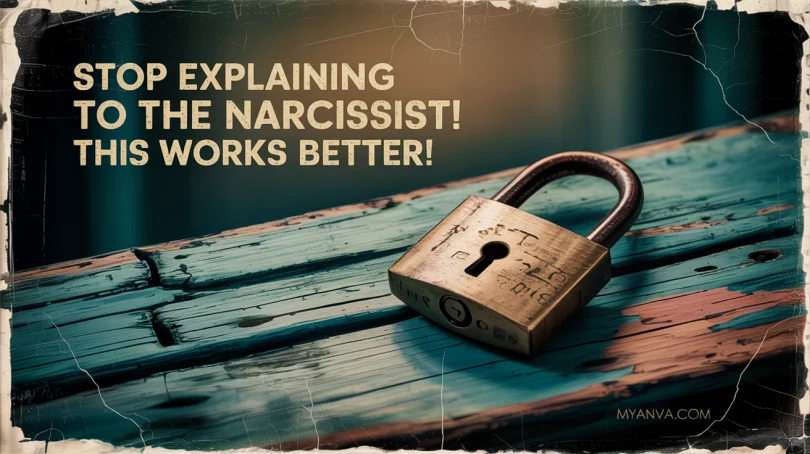Today I wanted to talk to you about something that I think is important and possibly one of the hardest things for a narcissist’s loved ones to learn, and that is that you need to stop explaining.
The Emotional Lens of Narcissists
Narcissists look at things differently than the rest of us do. They are guided by emotion, not logic, not reason, and not intelligence emotion. This often causes their perception of things to be very, very different from other people’s.
They view everything through the lens of feeling, and their feelings are generally negative, out of control, and even frightening to them. This causes their perceptions and experiences to be negative and frightening to them as well.
Feelings as Facts
They believe feelings are facts. That’s not just a saying or a metaphor; they believe their feelings are facts. If they feel it, it must be true, regardless of whether it makes any sense or if they have any proof or anything else.
Most people realize that feelings are not reliable. They sometimes make no sense, they’re sometimes irrational, and they are certainly not facts. Most of us realize that high emotion can alter perception and that events viewed through the lens of emotion are often not viewed correctly.
Related Topics:
How Narcissists Manipulate Even the Smartest People?
6 Disturbing Things Narcissists Secretly Do When Alone
9 ways to deal with toxic people
Distorted Reality Through Emotion
Narcissists do not understand this. They experience things exactly the opposite way. Events viewed through the lens of emotion are altered by the narcissist to fit the emotion. If they’re angry at you, everything you do will be perceived negatively, no matter what it is.
If you’re smiling, you must be laughing at them. If you brought them a sandwich or offered to share your food, there must be something wrong with the sandwich or the food. Even things you did in the past that were okay at the time are now viewed through this lens and found to be evil.
The Shifting Truth
Yesterday you were washing dishes together and laughing, having fun. No unkind words were said; there were no problems at all. Today, they were only helping you wash dishes yesterday because you forced them to do it so you can laugh at how much of a slave they are. In reality, the narcissist’s “truth” changes with their emotions. When they’re angry, you’re bad, and they hate you.
You also hate them and are cruel. When they’re happy, you’re good, and they love you. You also love them, or at least you like them, and you’re not mean to them. It has nothing to do with actual reality or anything you’re doing. It’s all based on unreasonable, irrational, and faulty perceptions.
The Futility of Explaining
Because of this hugely divergent way of seeing things, people who are dealing with narcissists often find themselves looking for a way to bridge that gap.
They find themselves constantly explaining to the narcissist that the narcissist’s perception is incorrect or faulty, that the narcissist is adding the wrong things together, or coming to ludicrous conclusions based on things that aren’t real, weren’t said, or didn’t happen. That’s understandable.
Rational adults speaking to other adults are going to use reason and logic to try to get the point across. What else is there to do? This usually works in most situations. Compromises are reached, points are made, and life goes on.
When Logic Fails
The trouble comes when you find yourself dealing with a seemingly normal, cognizant person who five minutes ago was speaking with you like a reasonable, intelligent adult who now cannot even understand a basic point you’re trying to make or simple words that you’re saying.
Worse, they seem to have misunderstood you terribly and are now angry, upset, and offended. So what do you do? As a rational, reasonable person, you try to explain. In most situations, that would be the right thing to do. With narcissists, it’s exactly the wrong thing.
The Internal Misunderstanding
You see, there’s been no misunderstanding, not the kind that you think. The misunderstanding is not from you to the narcissist; it’s within the narcissists themselves. They did not hear you wrong.
They did not misunderstand what you said. What happened was they reacted to their own emotions and then blamed that on you. It has nothing to do with you at all. And when you think about it in that context, the behavior suddenly makes sense.
The Narcissist’s Internal Dialogue
When you brought them that sandwich, your motive was simply to do something nice and give them a sandwich. They didn’t misunderstand that because they did not consider that. They don’t care what your motive is, not really.
It’s all about what’s happening on their internal landscape, and all they’re hearing is: you’re stupid, you’re ugly, you’re garbage, you’re worthless, no one loves you, everyone’s laughing at you, they don’t care about you. You just got caught in the crossfire.
The Impossibility of Convincing Them
You can try to explain that your motives are not negative, that you don’t hate the narcissist, that you don’t think they’re garbage or whatever else, but narcissists have been listening to that internal dialogue their entire life, and they are completely, totally, utterly convinced of that.
They’re never going to believe you. They’re not even gonna hear you. Did you ever notice that it seems like they’re listening and responding to someone else while you’re talking, someone who’s saying something completely different than what you’re saying? That’s because they are.
Expecting the Worst
Narcissists expect to be treated badly because of that very thing. They therefore look for evidence of that in every single thing other people do, and of course, they find it mostly because they push and provoke and harass other people and refuse to accept anything else.
For example, a wife is speaking with her narcissistic husband. It’s the classic narcissistic argument where no matter what she says or how she says it, everything that comes out of her mouth is hurtful, hateful, and wrong.
Rejecting Respect
The wife is attempting to explain to the narcissist, reasonably and logically, that his accusations are senseless and untrue. As she’s talking, while she’s talking, she calls him “honey.” The narcissist replies, “Don’t call me honey,” in a disgusted tone of voice.
The wife loses her cool and replies, “Fine, so I won’t.” The narcissist then says, “That’s more like it.” Now, this was no doubt intended to be like a knock against the wife, to imply that the wife shouldn’t be using terms of endearment because that’s fake and insincere because she’s so horrible and abusive.
But it says more about the narcissist than anything, doesn’t it? They cannot accept being treated respectfully. It jams their radar, so to speak, and it makes them very, very uneasy.
Provoking Conflict
Since they expect to be treated badly, they are constantly on edge, waiting for that to happen. They will often cause arguments or accuse people of treating them badly for no reason, simply to fulfill that expectation and their internal tension. Sometimes after they do that, you can see the relief on their faces: now I don’t have to wait anymore; the other shoe has dropped, here’s the argument.
Why Explaining Is Useless
Explaining in these situations is useless. You are not gonna get anywhere. Not only are they not listening, they don’t want to believe you. They want to believe you’re evil. It makes them victims, it makes them the center of attention, and most of all, it makes them right.
If they have to accept that you’re not evil, who is to blame for all these problems? There’s only one person left in the narcissist’s cartoon, comic book view of the world. There always has to be a villain and a hero, by the way. If the villain isn’t you, it’s gonna have to be them. And if that’s true, then it means that everything that voice says to them is right.
Narcissism as a Defense Mechanism
Don’t forget, that narcissism is nothing but a defense mechanism against that little voice. That little voice says they’re evil, horrible, disgusting vomit on the ground.
So, in self-defense, the narcissist created a false self that is the total polar opposite of that of a hero, in other words. But someone has to be evil because all this hurt and bile and anger and bitterness has to go somewhere. So it has to be you.
From Hero to Villain
You were once the hero when they first met you, and you were perfect, and you were gonna save everyone and make everything great.
But you revealed yourself as a lowly human with no special powers, and worse, you revealed that they were a lowly human with no special powers either. So you’re now the villain in this story, and you can never be anything else.
Feeding Their Ego
Beyond that, they like that you keep trying to make them understand that you love them. They like the futility and the sincerity and the desperation and the fact that you keep trying and keep jumping through all these hoops for them.
They don’t believe you, and they never will, but they love to hear it just the same. They like frustrating you and upsetting you and sucking your life force out one pointless argument at a time.
Explaining is therefore really only feeding their ego and their egoistic need for attention in the end because they’re not gonna believe you. They don’t want to, and even if they did, the voice of that brutal superego that piles them on with internal abuse 24 hours a day…
The Narcissist’s Blind Spot
Unless their disorder is set up so perfectly that exactly the things they need to hear and understand to change their lives are exactly the things they’re programmed to deny and block out the most.
It’s sad when you think about it because of that blind spot. They simply self-destruct over and over and over again. They are some of the most miserable people alive, and they walk around their entire lives never realizing they’re doing it all to themselves. There are none so blind as those who refuse to see.
The Trap of Explaining
It’s very easy then to get caught in the trap of explaining. When a problem is so easy for us to see, of course, we’re gonna try to make the other person understand: hey, you can fix this, all you got to do is stop doing this and that the other thing.
As a rational adult person, that’s what most of us do. We attempt to communicate. If the communication is getting fouled up along the way somewhere, we try to fix that so that we’re heard and things can be resolved.
Unreachable Lines
The problem is that in this situation, the lines are crossed in a place where you cannot reach or affect them. It doesn’t matter how much you say it or how many times you say it or how you say it or what you say, they’re not gonna hear it.
They can’t, and they don’t even want to anyway. There’s too much at stake for them to believe you, and because of that, they never will.
Holding Onto False Hope
There are many people right now suffering in relationships with narcissists of all kinds parent, child, husband, wife, all kinds holding on to hope that things are going to change, holding on to the hope that if they can just somehow explain it right, the narcissist is finally, finally going to understand.
But their brain does not work like yours does. The reality is, that the chances are a thousand to one because these people have a vested interest in things staying the same as they are right now.
How to Respond Instead
So what do you do when the narcissist accuses you of something that is not true or when they have one of their classic, patented misunderstandings? Simply tell them that they’re entitled to their opinion and leave it at that.
You can say, “I’m sorry that you feel that way, but you’re entitled to your opinion,” or you can say, “I disagree with that, but you’re entitled to your feelings.”
Avoiding the Chaos
There’s no reason to get bogged down in some antics about what was said and how it was said and the ulterior motives that you don’t have and “oh, I can prove it to you” or any of that because it’s a waste of time. It will go nowhere, and it’s never gonna end. Nothing is gonna get resolved.
If you say the things that I’ve suggested, it asserts that you disagree with their interpretation, but it does not feed into their need to create chaos and torture people to get attention. It doesn’t reward the behavior, in other words.
Breaking the Drama Cycle
If you’ve seen the episode of this show called “How to Break the Drama Cycle and Stop Reacting,” then you know that narcissists don’t know how to respond to that kind of non-reaction.
At first, a lot of times they will push harder and provoke more, trying to get a reaction out of you, which is all they wanted in the first place anyway. Hold your ground and don’t give in. It’s difficult, but it’s worth it unless you like having six-hour arguments over nothing.
Letting Go of the Need to Win
Now, some people have difficulty doing the non-reaction reaction. They don’t like “letting the narcissist get away with the things that they’re saying.” That’s understandable; it is. But my response to that is, if you roll around in the mud with the pig, all that’s gonna happen is you’re gonna get dirty too. Do yourself a favor and stay clean.






